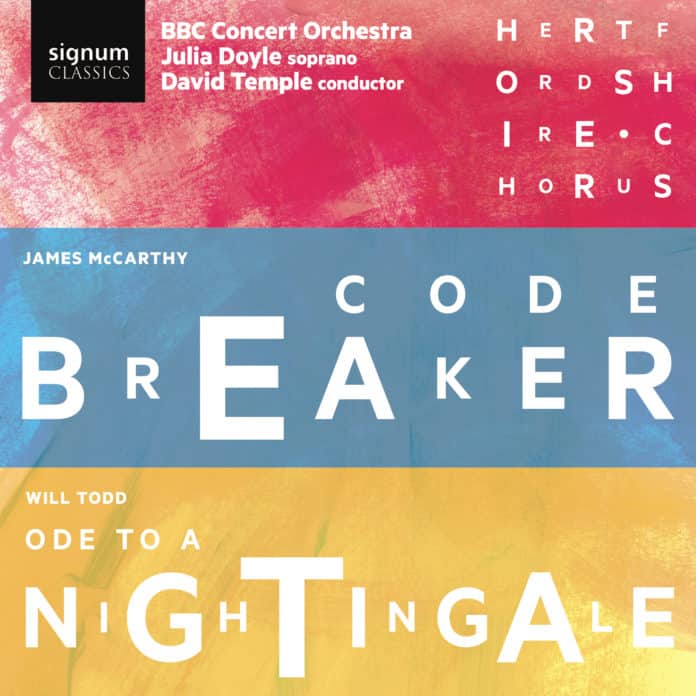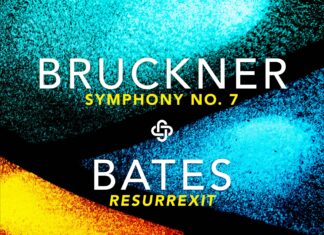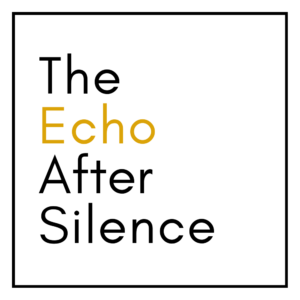This is a major new addition. Codebreaker is a 55-minute piece for choir, orchestra and soprano, composed by British composer James McCarthy and premiered only a few years ago.
It is difficult to distinguish the style of the work, but perhaps I could describe it as a combination of Adams and Nyman but with more introspection (and more silence in the slower sections). Between loud passages and soft confessional soprano parts, the listener takes a journey into the (tormented) soul of Alan Turing, famous leading mathematician who broke the Enigma code during the Second World War and was punished for his homosexuality, eventually committing suicide a year later (his name became familiar to the rest of the world with the release of the 2014 movie The Imitation Game). The texts McCarthy sets in music are by Oscar Wilde, Edward Thomas and American poet Sara Teasdale.
After the impressive beginning, we hear Gordon Brown’s public apology for Turing’s treatment and only then do we witness Turing’s schooldays, his falling in love with his fellow school pupil Christopher Morcom and the premature death of the latter. There is even a radio extract by Neville Chamberlain declaring the start of the war, during which Turing managed to crack the Enigma code and save millions of lives.
It is important to note that what characterises this musical journey is an aftertaste of nostalgia for the British choral singing tradition. When the choir sings loudly it does so exuberantly, but always with a touch of melancholy. It is this sense that marks all movements of this extraordinary work and the real wonder here is how every single one of them is so musically accessible.
Such is the direct emotion of the musical language that passages like the lyrical I Shall Meet Him Again could easily move to tears even the most demanding listener. Other highlights include the volatile Wondrous Light and Enough, as well as the energy-driven At Sea. And then there is the solemn and sublime De Profundis. But to just pick the highlights of the album would be to limit the power of this masterful composition. And indeed its strength lies in its relatively short duration (short when compared to most oratorios, if we are to classify it as an oratorio) which is ideal to pack a dramatic punch. The orchestration of these more inward movements is soft and ethereal and, overall, the piece has a translucent innigkeit tracing the steps from the life-affirming human joy to pain and the final catharsis.
Listen on Spotify:
In the end, it all comes down to the honesty of James McCarthy composition. First of all, he doesn’t try to impress in any way. Do not expect any musical innovations here, the work does not contribute any groundbreaking ideas to music. And let us not forget that great art should not primarily be about breaking rules (a huge trait of the postmodern era) but about communicating the vision of the artist and enhancing our spiritual development.
From this piece alone, one can attest that McCarthy is an important contemporary composer (and at this point I’d like to draw your attention to Rob Cowan’s glowing review for Classical Ear).
The second composition on this album is the Ode to a Nightingale by Will Todd. While employing a completely different orchestral palette, this work also has its roots in the contemporary British vocal tradition of recent years, using a post-romantic approach to set Keat’s famous poem of the same name. Imagine a pristine garden full of exotic colourful flowers after dusk: this is how I would visualise this lucid work which begins and ends with what sounds like actual nightingale singing.
The orchestration is lush without sounding overwhelming, often creating an atmospheric, eerie background for the poem, solo instruments sometimes taking the lead to enhance the otherworldliness of the setting. In my opinion, it is the darker parts that are more impressive like the magical Thous Wast not Born for Death, which begins with a Mahlerian soundscape and transforms itself into a menacing funeral march.
In both works the playing from the BBC Concert Orchestra is exemplary and the singing of the Hertfordshire Chorus is even more impressive. Soprano Julia Doyle is flawless and poignant and conductor David Temple really works wonders in both works. As for the recording quality, Signum Classics has captured the sound ideally with enough ambience.
This is an outstanding release in every way, showing us that contemporary music can safely return to its tonal roots without sounding outdated. Nimrod Borenstein, whose outstanding violin concerto I have reviewed here, said that while art has moved on from post-war modernism, music has been stuck in the latter style (to quote an excellent interview by Jessica Duchen in the JC). I should add that perhaps there is this highbrow misconception that music that sounds accessible is composed for the masses and not for the real connoisseurs (sic). This is not true, but even if it were, one has to bear in mind that the Great composers of the past did compose for the masses.
But enough said. What we have here is honest, unpretentious music that touches the human soul, and that is what matters.
For me, this is undoubtedly the choral album of the year.
Rating: ***** (Gold)
James McCarthy, Codebreaker ; Will Todd, Ode to a Nightingale
Julia Doyle (soprano)
BBC Concert Orchestra
David Temple (conductor)
signum CLASSICS
BUY OR LISTEN – ITUNES/APPLE MUSIC
Extra material:
https://youtu.be/GZ_eCf8IhAQ






